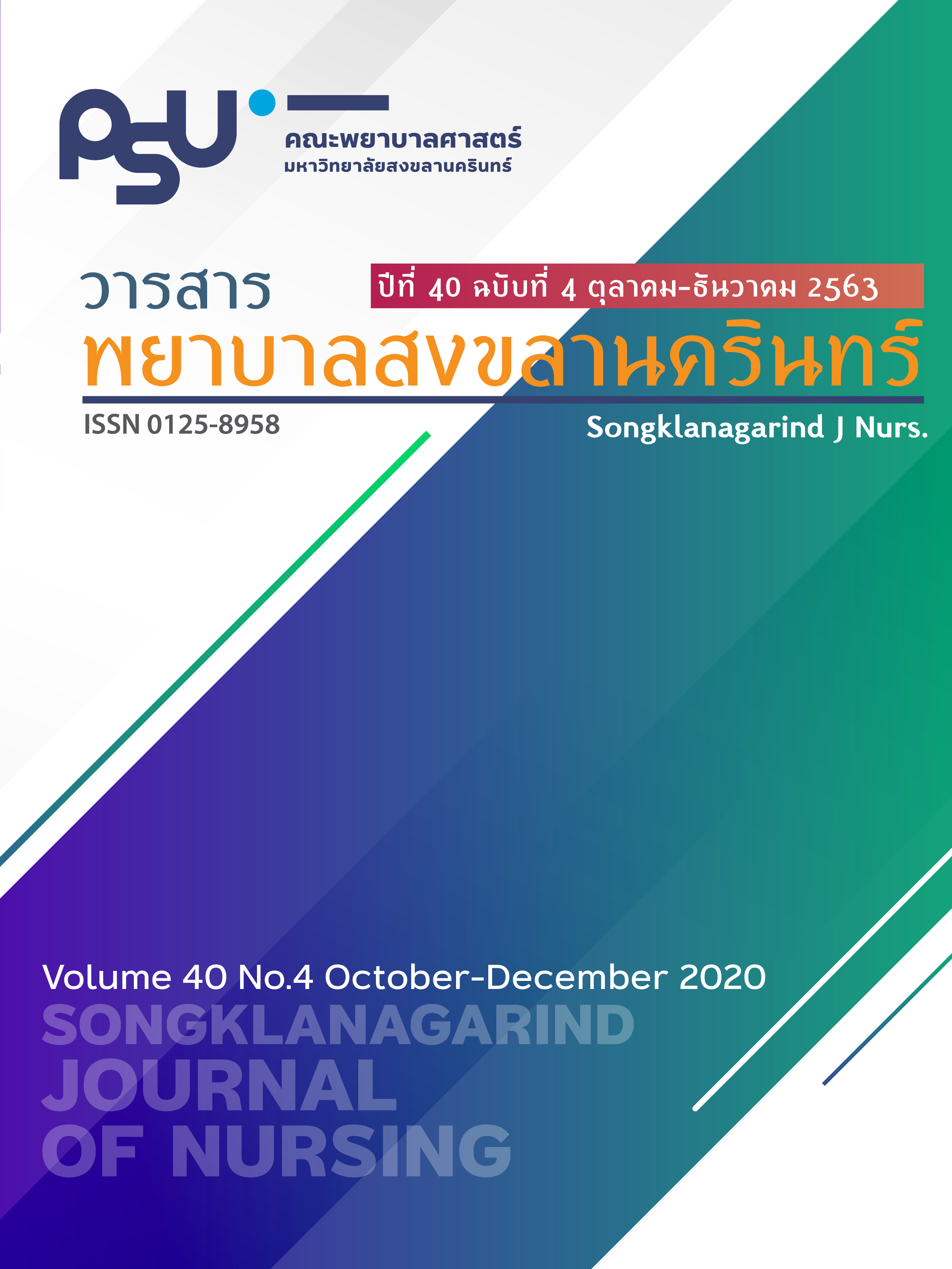The Development of Community Empowerment Program on Eating Behaviors Modification Among Muslim Women with the Risk of Hyperlipidemia
Main Article Content
Abstract
This research study aimed to develop a community empowerment program facilitating eating behavior modification among Muslim women with risk factors of hyperlipidemia. The way of promoting a healthy community were promoted through community participation. Transtheoretical model of change concept was
employed to promote personal skills. Nutritional education in prevention and control hyperlipidemia, Islamic
way of eating practice, and empirical evidence related to eating behavior modification were integrated to design program activities. The study was divided into two phases. program development and the feasibility testing phase. Research instruments consisted of content validity evaluation form and program feasibility evaluation form. The new program was content validated by three experts and feasibility tested by nurses working in three primary care units. The results revealed that the new program comprised three components: 1) a program guideline 2) a program plan for community empowerment activities including 3 stages: preparation stage, empowerment stage and evaluation stage, and 3) a community empowerment manual. The evaluation of program content validity showed that the program content was valid and feasibility showed that each program component provided detail description so that it was easy to use and appropriate to Muslim contexts. The program media was useful and interesting. Further experimental research is needed to demonstrate the effectiveness and efficiency of the program on eating behavior among Muslim women with risk factors of hyperlipidemia.
Article Details
References
Aekplakorn W. Thai national health examination survey, NHES V [Internet]. Nonthaburi: Health Systems Research Institute; 2014 [cited 2019 May 20]. Available from: https://www.hiso.or.th/hiso/picture/reportHealth/report/report9.pdf.
Prasertwachirakun P. Guidelines for management of dyslipidemia in the service primary hospital [Internet]. Songkhla: Songkhlanakarin Hospital; 2011 [cited 2019 May 20]. Available from: http://medinfo2.psu.ac.th/commed/web/pdf/5/dyslipidemia.pdf.
Lillahkul N, Supanakul P. Way of life of Muslim people in Thailand’s southern provinces and health promoting lifestyle. The Southern College Network Journal of Nursing and Public Health. 2018; 5(2): 302-12. Thai
Kelley GA, Kelley K, Roberts S, et al. Combined effects of aerobic exercise and diet on lipids and lipoproteins in overweight and obese adults: A meta-analysis. J Obes. 2012; 2012. 1-16 doi: 10.1155/2012/985902.
Mannu GS, Zaman MJS, Gupta A, et al. Evidence of lifestyle modification in the management of hypercholesterolemia. Curr Cardiol Rev. 2013; 9(1): 2-14. doi: 10.2174/157340313805076313.
Stradling C, Chen YF, Russe T, et al. The effects of dietary intervention on HIV dyslipidaemia: A systematic review and metaanalysis. PLoS One. 2012; 7(6): e38121. doi: 10.1371/journal.pone.0038121.
Muatjan N, Thanasilp S. The effect of food consumption behavior modification and qigong program on blood cholesterol and triglyceride level of people living with HIV/AIDS. Journal of Bureau of Alternative Medicine. 2013; 6(1): 1-18. Thai
Tassanasorn P, Glangkarn S, Phonprugsa P. Health behavioral modification model for lipid reduction among personnel with dyslipidemia at fort weerawat yothin hospital in Surin province. Journal of The Royal Thai Army
Nurses. 2012; 13(2): 49-59. Thai
Chantawang S. Effects of a self-management supporting program on self-management behaviors and serum lipid level among elders with dyslipidemia [Thesis]. [Chiang Mai]: Chiang Mai University; 2011. 77 p.
Leecharoen P. The effect of behavior change program upon lipid of patients with diabetic type II, Lower southern region [Thesis]. [Bangkok]: Chulalongkorn University; 2011. 137 p. Thai
Sih M. The effect of social ecological model and stag-base work place health promotion program on blood lipid control behaviors and total cholesterol in employees of the electricity generating authority of Thailand [Thesis]. [Songkhla]: Prince of Songkla University; 2017. 180 p. Thai.
Tangsangwornthamma C, Hathirat S, Leelapattana W. Lifestyle modification and drug administration
among Thai Muslim patients with diabetes mellitus type 2 during ramadan. Journal of Medicine and Health Sciences. 2010; 17(2): 70-86. Thai.
Boonyasopun U. Way of promoting a healthy community. (Learning document of community nursing). Songkhla: Faculty of Nursing, Prince of Songkla University; 2000. Thai.
Prochaska JO, Diclemente CC, Norcross JC. In search of how people change: Application of addictive behaviors. Am Psychol. 1992; 47(9): 1102-14. doi: https://doi.org/10.1037/0003-066X.47.9.1102.
Srimuang P. Health cuisine and dietetics. Bangkok: M&M Laser Print; 2012.
Lohvitee V. The strengthening of well-being in accordance with guidelines suggested by the messenger of Islam. RSU Journals. 2020; 15(2): 65-76. Thai.
Beyea S, Slattery M. What is evidence-based practice, in evidence-based practice in nursing: A guide to successful implementation. United States: HCPro [Internet]. [Cited on 2015 Aug 20]. Available from https://books.google.ca/books.
The Joanna Briggs Institute. Joanna brigss institute reviewer’s manual: 2014 edition. Australia by Solito Fine colour Printers. The Joanna Briggs Institute. 2014.
Mad-Adam A. The development of community empowerment program for behavior modification
for weight control of overweight Muslim women patients with co-morbidity. Songklanagarind J Nurs. 2016; 36(2): 118-31. Thai.
Health education division, Department of health service support ministry of public health. Community health behavior modification [Internet]. [Cited on 2016 Mar 15]. Available from http://www.hed.go.th/linkhed/file/89.
Intarasorn P, Laohasiriwong w. Evaluation of health behavior modification village to reduce CA. KKU Res J (GS). 2012; 12(2): 30-41. Thai.
Olarikkachat T. The effect of a behavioral change program on health behaviors and blood lipid of hotel staff with hyperlipidemia [Thesis]. [Songkhla]: Prince of Songkla University; 2015. 145 p. Thai.
Chaikul C. Effects of self-management and family participation enhancing program on health behavior and blood pressure among elderly with hypertension [Thesis]. [Songkhla]: Prince of Songkla University; 2014. 157 p. Thai.
Thanakwang K, Rattanawitoon J, Tanurat J. Development of friendship networks and potential of self-help groups to promote healthy aging among community-dwelling older adults. Journal of Health Systems Research. 2011; 5(3): 381-91. Thai.
Makeng M. The effect of Muslim-based health behavior modification program on diabetes control behaviors and blood sugar level of uncontrolled diabetic Muslim patients with comorbidity [Thesis]. [Songkhla]: Prince of Songkla University; 2016. 152 p. Thai.


